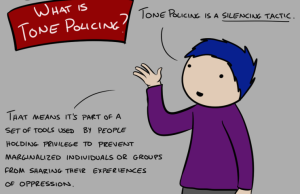Hi, welcome to Feminist Fridays or Feminist Wednesdays, or whatever day this is going up, a series where we explore the social, the political, and the media from a feminist and an intersectional perspective.
Today we’re going to be talking about the difference between sex and gender. You might be thinking, “What, I thought those were two pretty similar things,” but they’re actually very, very different. We’ll start with sex, if you know what I mean.
When we talk about a person’s sex we normally use it to refer to their biology. It’s a two-category or a binary system based on a person’s genitalia, chromosomes, and hormones that classifies people as either male or female. It’s also the social, the legal, and the medical classifiactions of one’s body that’s assigned at birth. It may seem like a pretty simple idea but it can actually be pretty problematic. We’ll talk more about that later.
Gender, on the other hand, is slightly trickier, so much so that entire fields of study are dedicated to finding out the social significant it has on people’s lives. For example, shockingly, I am a women’s and gender study major so I think gender is pretty damn fascinating. Gender is many things. Gender is how someone identifies, and it’s something that’s ascribed to each of us at birth in relation to our bodies. When you’re born you have no say in what gender you’ll be raised as. Basically, if you have a penis you’re a boy, and if you have a vagina you’re a girl. If you’re born intersex, like one out of every 2,000 people, meaning your genitalia is ambiguous or doesn’t fit the traditional definition of what we consider male or female, then immediate emergency surgery is usually performed to make your body fit one of these definitions. Yikes.
However, gender is much more than that. Gender is a social category. It contains the roles, dress, behavior, and expression expected of a person based on an arbitrary category given to them at birth. For example, the idea that women are nurturing and compassionate, whereas men are stoic and unemotional. I actually go into this idea a lot more in my “What is the Patriarchy?” video, so if you want to check that out, I’m going to link to it below.
Basically, there are two schools of thought regarding gender. Social construction is the creation of categories that we attach meaning to. If you believe that gender is a social construct, then you basically believe that gender is something that we create within our societies. Social constructs vary across cultures and over time. Something that we would consider evidence that gender is socially constructed is that our views of femininity and masculinity are different now than they used to be 100 years ago, 200 years ago, even 50 years ago. Biological essentialism, on the other hand, is the belief that the traits we associate with men and women are undebatable facts and are unchanging. For example, an essentialist view of sex and gender would be that cis-gender men are naturally more aggressive and dominating than women just because of their biological makeup and not the way that they’re socially conditioned. I personally reject essentialist ideas because I think it’s a really limited view and doesn’t account for any of the nuances of gender.
Sometimes social products have been around for so long that they seem natural and concrete and we don’t even question them, but here are some things to consider. Gender is not something that’s universal. Characteristics attributed to cis-men and cis-women have changed over time and vary from culture to culture. Gender is also much more fluid than we give it credit for. Biological essentialism pretty much completely invalidates the existence of trans and non-binary people. When we think of gender and sex we normally think of sex as purely biological and gender as something that’s social, but even when you look at biological sex it’s not necessarily something that’s natural or essentialist. Physical characteristics like genitalia and chromosomes exist, but sex as a category is a social construction.
For example, the ancient Greeks only had a one-sex system. They viewed women as inside-out men. Flash forward to today, where doctors are slowly beginning to change their views about sex and gender and they’re starting to view intersex as a third category of classification. Because why should we force an unnecessary and irreversible surgery on intersex babies to make them conform to an inaccurate two-sex system when we can just let them figure it out as they grow up?
Also, for a system that is supposedly based on biology, it only takes a very surface level view of sex. Most of the doctors will just be like, “Hey, you have a penis. You must be a boy,” instead of taking a deeper look at chromosomal makeup. There are a lot of sex chromosome disorders that can happen that might not even be readily apparent by just looking at physical characteristics of someone’s body.
Let me know what you guys thought. Leave a comment telling me about your experiences with gender. Are you more of a social constructionist or biological essentialist, in which case I might need to direct you to some more information. Anyway, like this video if you learned something, and subscribe for more videos.




















